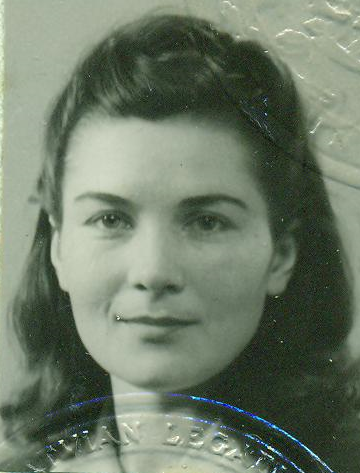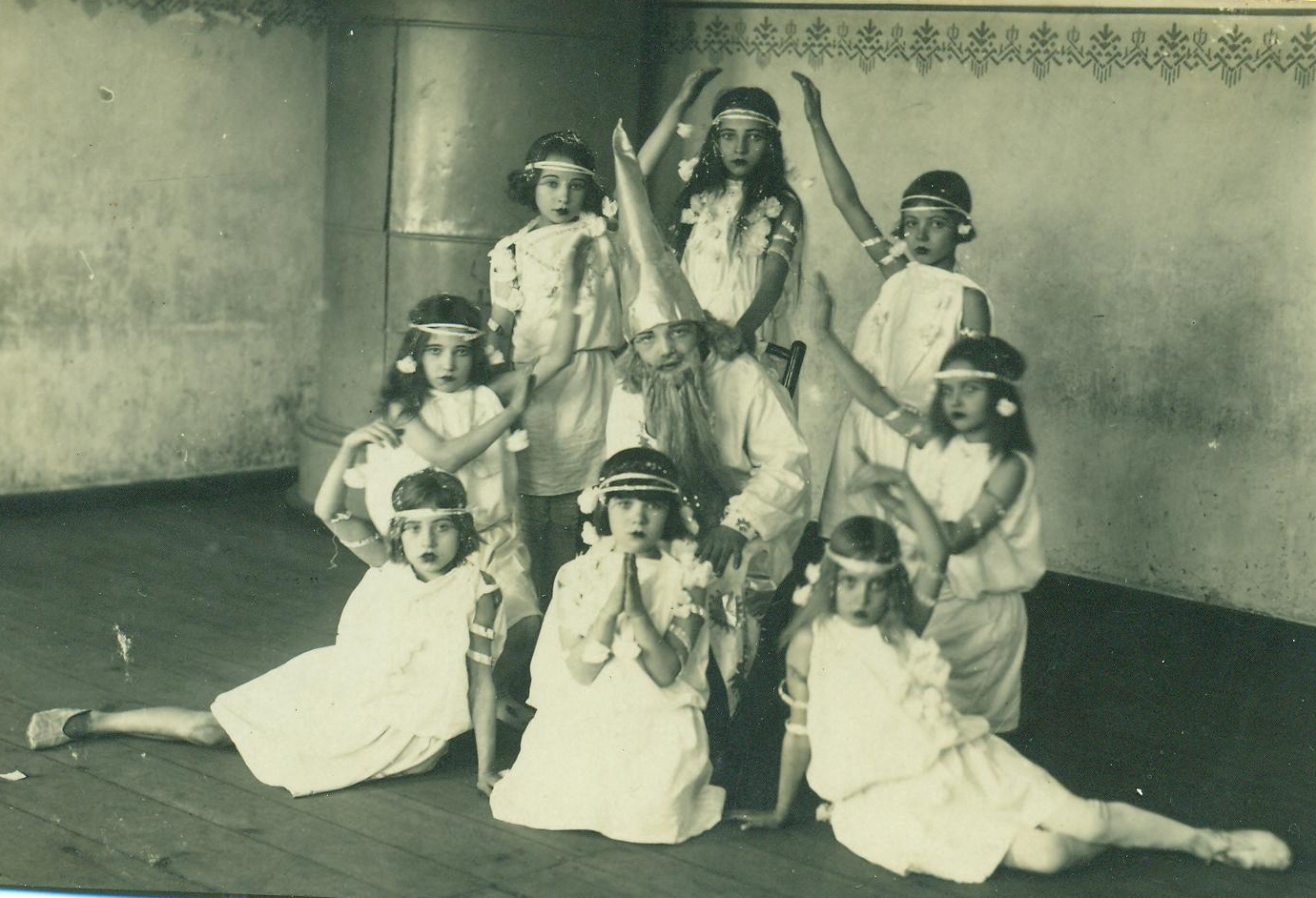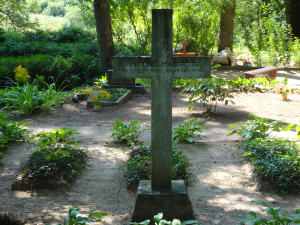This is my Week #39 52 Ancestors post, and it is dedicated to a very recent ancestor of mine, my grandmother Aina Margrieta Līcīte, married name France, who passed away yesterday at the age of 95.
Aina Margrieta (Līcīte) France
October 19, 1919 – October 29, 2014

Passport photo of Aina Līcīte, c. 1947
Aina Margrieta Līcīte was born on October 19, 1919 to parents Brencis Līcītis and Jūle, maiden name Štelmahers. Her older sister, Marta (who passed away four years ago, you can read my memorial post dedicated to her here), was eight years old at the time.
However, the precise place of her birth is shrouded in mystery. All of her later documentation states that she was born in Krustpils, Latvia, and her sister Marta also confirms this. However, given the circumstances of the time period, I have my doubts about the veracity of this statement. First of all, the registry office archives were not able to supply me with her birth record – it did not exist in the otherwise fairly complete (I’m given to understand) registers of Krustpils. Then you must consider that while the First World War ended in 1918, the Russian Civil War and the concurrent Latvian War of Independence, with its multiple opposing armies, were still raging at the time of Aina’s birth. Not only were they still going on in the abstract sense of “somewhere”, they were going on in a very real sense of right around where she is purported to have been born. The Free Latvian forces had taken the town of Krustpils on June 5, 1919, but in October – when Aina was born – they were still battling the Reds in LÄ«vÄni -barely 20 kilometres to the southeast – and the rest of Latgale province.
Given that I know that Aina’s parents and sister were living near Rzhev, Russia, during the First World War, a fact I know both from Marta’s stories and documentary evidence, and the fact that most Latvian First World War refugees did not return until 1920 at the earliest because of the ongoing conflicts, I think it is highly unlikely that my great-grandfather Brencis brought his pregnant wife and young daughter back to their hometown so that their daughter could be born there. I think it is much more likely that Aina was born near Rzhev, and the family returned in 1920-1921. I am currently trying to confirm this with refugee registers.
Why lie about her place of birth? It was not unusual for children to be born outside of Latvia during this time period, so many Latvian children born in that era are listed as being born in Russia. But at the same time, they may have thought that the family would have problems getting their young daughter Latvian citizenship since she was born outside of Latvia. I haven’t ever seen this be a problem, but they may have been worried nonetheless, and thus lied about it. With no documents to contradict them, then they could easily continue telling that story. But I am intent on finding the truth of the matter.
Regardless of her place of birth, Aina grew up in Krustpils, attending school there, where she got average-to-good grades in all subjects. She had top marks for behaviour, but lower ones for paying attention – I know where I get my classroom inattentiveness from then! She also participated in some theatrical productions. In this photo, Aina is in the center of the first row.

Aina graduated from JÄ“kabpils State Gymnasium in 1938. She had “good” or “very good” grades in all subjects. After this completion of high school, she left her family home of Krustpils and moved to RÄ«ga to attend nursing school, which she completed in 1941. Finding employment as a nurse in the midst of war was not a difficult task – and it was through this occupation that she was able to make it out of Latvia. Along with her sister Marta, who was a nurse’s aide, they made it out of Latvia to Poland, and then by ship from Gdansk to Germany and Denmark. When they arrived in the Displaced Persons camps, they did not have everything that they had brought out of Latvia with them – just the backpacks they were carrying. Their other luggage had been lost on a different ship that had been sunk by the Allied forces.
In the Displaced Persons camps in Denmark, probably at Gurrehus, Aina met her future husband Aleksandrs Francis, who was the Latvian leader at the camp, despite only being 25 years old. Eventually the refugees moved to Copenhagen, where Aina worked at as a dressmaker at Modepalæet on Osterbrogade for two years, until the opportunity finally came for the sisters to emigrate to Canada in the summer of 1949.
When Aina arrived in Canada, she had a work contract with the Toronto Hospital and lived in the Nurses’ Residence in Weston. Once this one year contract was over, she worked for the Convalescent Centre at the Weston Sanatorium. In this same year, she married Aleksandrs Francis on May 24, 1950, in Toronto.
A few years after the birth of their daughter in 1951, Aina and Aleksandrs moved to Saint Catherine’s, where they built their own home – scandalously placing their living room in the rear of the home, overlooking their beautiful garden, instead of at the front, where nosy neighbours would have preferred to see it. Aina and Aleksandrs became Canadian citizens in 1957. In addition to family trips to Mexico, the family also acquired a cottage in northern Ontario, where they would spend time in the summer.
Aleksandrs died suddenly in 1983, leaving Aina a widow. It would be another thirty-one years until she would join him in the great beyond.
I was born in 1984, and I have all sorts of memories of my grandmother from my childhood. I remember visiting her in Saint Catherine’s, where we’d play tennis with foam balls in her hallway. I remember going to the German store in Hamilton to buy Central/Eastern European Christmas goodies. I remember sitting on the windowsill of our house up on the hill, waiting and watching for my grandmother’s blue VW Beetle coming up the road, signalling that she and her sister were coming to visit.
When I was nine years old, they moved up from Saint Catherine’s to live in the same town as my parents and I, living just down the street. Marta moved to a nursing home after breaking her hip, and Aina moved there as well a few years later. Marta passed away in 2010. Aina had been getting weaker over the past few years, though this year she did improve substantially for a period of time. The last time I was able to visit, we were even able to take her outside in the wheelchair. But then the end came, and like her sister, she slipped peacefully into the eternal sleep.
Aina is survived by her daughter, son-in-law and granddaugther (me).
“Vediet mani dziedÄdami, Nevediet raudÄdami; Lai iet mana dvÄ“selÄ«te, Pie Dieviņa dziedÄdama.â€
Latvian folksong (daina): “Escort me while singing, not while crying; May my soul go, to God while singing.â€



